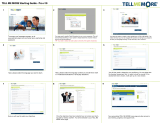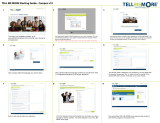
4 Securing your Chromebox and information
Device security is essential for protecting the condentiality, integrity, and availability of your information.
Standard security solutions and third-party software can help protect your device from a variety of risks, such
as viruses, worms, and other types of malicious code.
When you sign in to Chrome and enable sync, Chrome keeps your information secure by using your Google
Account credentials to encrypt your synced passwords. Alternatively, you can choose to encrypt all of your
synced data with a sync passphrase. This sync passphrase is stored on your device, and isn't sent to Google.
For more information on syncing your data, go to
https://support.google.com/chrome/answer/1181035?
hl=en .
IMPORTANT: Some security features listed in this chapter may not be available on your device.
Device risk Security feature
Unauthorized use of the device Power-on password
Viruses Antivirus software
Ongoing or future threats to the device Software updates
Unauthorized removal of the device Security cable lock
Securing your wireless network
When you set up your wireless network, always enable security features.
Backing up your software applications and information
All apps update automatically, and a record of your downloads and purchases is kept in the Chrome Store.
Google also saves your last synched settings automatically. If you have to perform a recovery on your device,
you can log in with your Google account and automatically retrieve all of your settings, favorites, and apps.
Saving important documents and les either to a USB ash drive, memory card, external hard drive, or to
Google Cloud storage is recommended. You may save your les to the cloud at any time by selecting the
Google Drive as your le save location.
Recovering your Chromebox
If you wish to give your Chromebox to someone else, reset owner permissions, or are having problems with
your account prole, you can clear all local user data by resetting your device.
NOTE: All data stored on your device, including permissions, settings, and user-owned les will be deleted
for all accounts by performing a factory reset. Resetting your device will not aect your accounts, or any data
synched to those accounts.
1. Click the status area in the lower-right corner.
2. Select Settings, and then select Show advanced settings.
Securing your wireless network 11





















